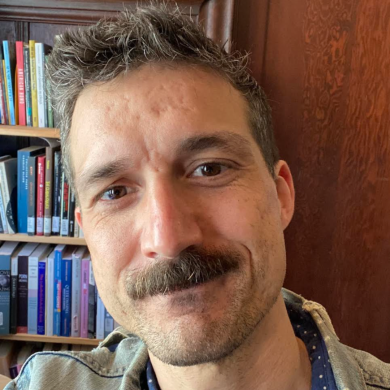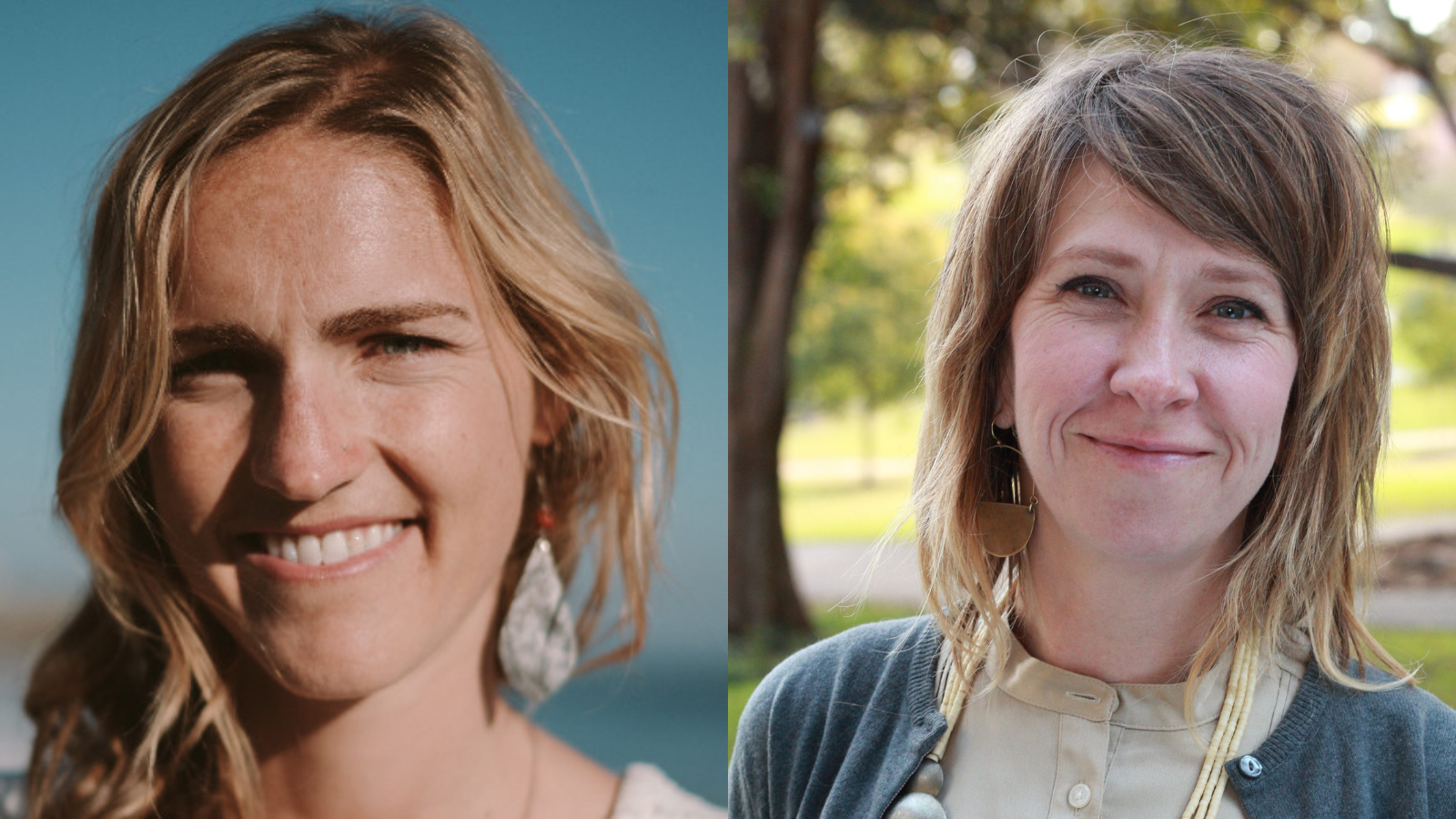Mentorship proves key to humanities graduate student success
A research collaboration between THI and UCHRI is bringing new insights to mentorship models for humanities graduate students

In Summer 2022, when Eric Sneathen (UCSC Literature PhD, ‘22) began working on a collaborative mentorship research project with The Humanities Institute (THI) and the University of California Humanities Research Institute (UCHRI), he did not realize what an important impact it would have on him personally and professionally. At the end of summer, Sneathen graduated from his PhD program and started a new position as the Graduate Program Adviser and Coordinator for another department on campus— Latin American and Latino Studies – where he’ll be mentoring future graduate students and supporting them with their academic careers.
Sneathen spent the summer as a THI Summer Graduate Student Researcher working with UCHRI Summer Research Intern Fellow Doreen Hsu (Sociology PhD Candidate, UCSD) and project mentors Kelly Anne Brown (UCSC Literature PhD, ’11), Associate Director of UCHRI, and Saskia Nauenberg Dunkell (UCLA Sociology PhD, ‘18), THI Research Programs and Communications Manager. The group met for seven weeks to examine existing mentorship models across UC campuses, identify humanities students’ unique mentorship needs, and determine how to support further mentorship initiatives in the UC system.
Sneathen and Hsu put together four focus group sessions with graduate students, staff, and alumni to learn more about the role sustained mentorship can play in addressing common challenges facing humanities graduate students such as equity, retention, isolation, and professionalization.

For Hsu, one of the most useful aspects of the project was the opportunity to develop a collaborative sense of what successful mentorship actually looks like. Many of the focus group participants shared the importance of a holistic approach to mentoring. Hsu explains, “Mentorship is a teaching and learning activity, and it is successful when it acknowledges and supports the mentee’s academic, professional, and social/emotional wellbeing holistically over a sustained period of time.” This holistic approach is especially important for historically excluded graduate students, including graduate students of color, international students, and women, who “report fewer interactions or challenges with mentors.” One of the key takeaways from the focus groups was the importance of holding the university accountable for supporting the students it admits. As Hsu says, “Universities have a responsibility to teach their grad students such that they can succeed within and beyond their programs, and mentorship is a key tenet of effective pedagogy.”
Universities have a responsibility to teach their grad students such that they can succeed within and beyond their programs, and mentorship is a key tenet of effective pedagogy.
Focus group participants also shared insights into the benefits of various mentorship models. For example, peer-to-peer models can be especially effective in addressing the “hidden” curriculum of the Academy, while alumni mentoring models can create pathways out of the Academy after graduation.
Sneathen was similarly drawn to the project because of the chance to think about holistic mentoring, or, as he puts it, “mentorship as a situation.” In the focus groups, Sneathen found there was widespread eagerness for mentorship that goes beyond discrete acts of service such as writing a letter of recommendation or helping to secure a fellowship, but that also includes emotional and psychological support, and attention to the student’s distinct needs and ambitions. As he says, “students and faculty must balance the demands of the present with a student’s desired outcomes for their education.” For Sneathen, this focus on outcomes is especially important because part of succeeding as a graduate student is about developing the capacity to imagine diverse uses for the skills gained in a humanities graduate program: “While respecting the needs of graduate students to be brought into the academic profession by faculty mentors specifically, it is possible to enlarge the scope of mentorship and its constituency by also enlarging the idea of what a graduate degree might be for.”

Networks open up opportunities for our graduate students to explore a variety of experiences, and often provide mentorship in ways that their faculty committees cannot.
Sneathen and Hsu’s research for the UCHRI/THI Summer Mentorship project emerged from UCHRI’s Stories from the Field report. The report considers the economic and professional outcomes of Humanities PhDs, to better track where humanists end up, how they apply their expertise, and the ways they are contributing to society. After Stories from the Field was published, Kelly Anne Brown facilitated conversations with deans and faculty at several UC campuses to talk about the findings and next steps. She also spoke with graduate students and PhD alumni, who shared with her that for them, the “untold story of Stories” was mentorship. For Brown, this amplified one of the major insights from Stories: the importance of building diverse professional networks. As Brown explains, “networks open up opportunities for our graduate students to explore a variety of experiences, and often provide mentorship in ways that their faculty committees cannot.” Post-PhD economic data from Stories showed that “graduate students with more robust professional networks fare better in a variety of job markets, which is great for students who come from families who are well situated to foster these networks; but for those students who don’t have these personal networks, it strikes me as imperative that the university has a role to play in helping to develop them.” This encouraged Brown to begin thinking about how to develop a UC-wide humanities mentorship program that could align with the quantitative and qualitative data from the booklet.
Last year, THI hosted a workshop on “Stories from the Field,” at UC Santa Cruz that was co-organized by Saskia Nauenberg Dunkell. Dunkell has spearheaded several successful mentorship programs for humanities graduate students at UC Santa Cruz, including the Graduate Student Success program, and the Questions That Matter Teaching program under the Expanding Humanities Impact and Publics Grant. When Brown suggested working with graduate students to research humanities mentorship, Dunkell was enthusiastic about the idea. She explains, “We’ve seen how meaningful different types of mentorship can be for current graduate students – from advice on teaching to considerations for putting together a committee, ways to deal with negative feedback, strategies for work/life balance, help with future careers and much more. I really appreciated the opportunity to think about mentorship further through our summer collaboration, and found it so valuable to have a research team come together from different campuses and disciplines to start to examine what kind of mentorship exists for Humanities students, how we can build on previous programs, and where we should focus future initiatives.”
I hope that I can offer students some of the support I felt I didn’t get while I was a graduate student.
Sneathen, too, was grateful for the chance to collaborate, especially as he carries his personal experiences and summer insights forward. Reflecting on the sense of isolation he felt while he was pursuing his studies, the summer mentorship research he conducted with THI/UCHRI, and opportunities in his new job, Sneathen shares “I hope that I can offer students some of the support I felt I didn’t get while I was a graduate student.”
Preliminary findings from the summer research project are continuing to shape THI’s mentorship programs and work to support student success, preparing the next generation of leaders in the Humanities and beyond.
